- Home
- Pat Conroy
My Losing Season Page 7
My Losing Season Read online
Page 7
In the second, third, and fourth quarters of the game against Asheville Catholic, something happened that had never occurred to me before in sport. I lost all sense of myself in the great tidal movements of the game itself, in the thrusts and retreats, the surges and falling back of teams rapturously engaged in a sublime submission to their game. I began taking long shots on the wing, half jump shots–half set shots, and I arched them high in the air and they came down without much backspin. The shots were without artfulness or beauty or much hope behind them. So high did I arch them, that they hung in the air for a long segment of time, then fell like fruit from the sky. They swished through the basket with the sound of torn fabric. I hit three in a row toward the end of the second quarter. In the fourth quarter I hit another three and my game had shifted into a high plane where it had never gone before.
It took two overtimes to defeat the gallant team from Asheville Catholic. Frazier and Carr, our two big rebounders, pulled the game out for us in final overtimes. Ted Frazier and I had both scored fourteen points and were high scorers. I looked up in time to see my father entering the gym with a busload of Rambler boosters he had driven to the game. My father had gotten lost in the snow and had found himself pulling his bus up to the campus of Queens College instead of Charlotte Catholic High School. He did not see me score a single point but my joy was so great I wanted to freeze-frame that moment of time and suspend myself in the honeycomb amber of that sublime moment.
The next afternoon, before a packed house, the Sacred Heart Ramblers took on the Cougars of Charlotte Catholic, the big-city team that had beaten us twice during the regular season, and we beat them by four points. After showering and dressing, my team sat together and watched the other semifinal game where the two most powerful Catholic schools in our part of the Southeast were about to take to the floor against each other. Bishop England of Charleston lined up against Benedictine of Richmond, which had a powerhouse athletic program that chose its athletes from five hundred Virginia boys. But it was only minutes into the game when we knew that Benedictine of Richmond was going to overrun Bishop England with its superior depth and firepower and speed. Bishop England went down by a score of 64–41, and I knew we did not belong on the same floor with mighty Benedictine of Richmond.
The next morning, the hallways of Sacred Heart shimmered with an excitement that was almost chemical in nature. Even the college nuns and coeds had caught fire with the improbable story of the thirty-boy high school competing against the largest Catholic school in the South, a high school power that looked all but unstoppable.
As I dressed for the game, I could feel the sudden paralysis come over me that terror brings to an inexperienced athlete’s body. I’d experienced butterflies before, but nothing like this. I felt like vomiting all during the warmup period. The Benedictine Cadets looked every inch like the Boston Celtics warming up. They appeared to be three inches taller than us and carried themselves with an arrogant grace that let you know that playing us was a kind of insider’s joke to them. They laughed and cut up on the sidelines. We were as serious as a quadratic equation, but I was the only one on our team who seemed afraid.
My first prayer to God that day was to thank Him for healing Buddy Martin’s right hand. My knees were shaking on the bench as I watched Sam Carr jump center against their big man. It took about five minutes of a game played with extraordinary intensity for Benedictine to know they were in a game and at least another minute to realize they were in the fight of their lives. One minute Wofford would have the hot hand and the next Carr would distinguish himself, or the pure hustle of Martin would carry the day or the heart of Sam Carr or the tenacity of Nicky Vlaservich. Together, they blended so effortlessly that if a team stopped one player cold they lit a fire beneath another on another part of the court. But on this night, Benedictine had more than it could handle from the chain-smoking, tough-talking little point guard, Johnny Brasch.
Though not a great jump shooter, Brasch lit it up with long-range jumpers all night long to the ecstatic cheering of the entire community of Sacred Heart who filled the gym to capacity. Every nun from the convent had come over with my father in the school bus and their cheering section looked like a lost colony of emperor penguins.
When we went ahead by eleven points, Benedictine went into a blanketing full-court zone press. I knew we were in trouble the moment they moved their players all over the court. Their guards Meyer and Berry started stealing the ball frequently from our guards. They began cutting into our lead and I saw Coach Crunkleton giving me the eye. But with a minute and a half left, Bud Wofford fouled out of the game and I heard the coach call my name. After I reported to the scorer’s table, I ran out to the court and took my position up against Jimmy Meyer.
By then, Johnny Brasch had taken over the game. He had assumed for himself all dribbling and scoring duties and let everyone else on the team know that he could do it, that he could pull us through and win the game for us. He came up to me, put his arm around me, and said, “Take the ball out of bounds, Pat. Get it to me. Then head up the court. If I get in trouble, come back to help me. Got it?”
I did what Johnny Brasch asked me to do. I got him the ball because I did not want it and lacked the courage to take the ball upcourt. My fear disgusted me but it consumed me. Brasch fought the whole Benedictine team and held them off all by himself. He broke the full-court press, with the help of no one. Once Meyer and Berry surrounded me when I received a pass and took it away from me with dispiriting ease and scored an open layup. I took it out of bounds and fed it into Brasch, who took the ball downcourt with everyone on the Benedictine team trying to stop him. He was heroic and magnificent and I fell to my knees and kissed the floor when the final buzzer sounded and we had prevailed 53–52 in the greatest upset in high school basketball in North Carolina that season. We carried Johnny Brasch off the floor, delirious with joy.
After my father had dropped off the nuns and students at Sacred Heart, he drove home in the bus with me standing up front beside him. His great dark interior disturbed the silence between us, and I knew better than to chatter when he had gone inward and his mood had darkened.
“You were afraid today, weren’t you?” Dad said.
“Yes, sir, a little bit,” I said.
“I could tell you were chickenshit and didn’t want to go into the game,” he said.
“I didn’t want to lose it for us, Dad.”
I did not see the slap coming, but its long looping arc caught me squarely on the mouth and I would have fallen into the well of the bus if I had not caught myself on one of the poles.
“Never be chickenshit on a basketball court again,” Dad said. “That’s an order, pal.”
“Yes, sir.” On the short ride home I promised to turn myself into a player who is reliable and impudent and highfalutin—I swore I’d be a guy my team could depend on, someone who could calm their fears and strike terror into the hearts of the enemy. From that day forward whenever I saw an opposing team go into a full-court press, I would call for the basketball and tell my teammates to get downcourt. By an effort of will and memory, I would turn myself into a Johnny Brasch.
WHEN MY FATHER RECEIVED his orders to report to the Marine Corps Advanced Amphibious Warfare Course at Quantico, Virginia, I broke down in front of my mother and raced into the woods behind our house where I wept for an hour. I loved everything about Sacred Heart Academy and was inconsolable at the thought of leaving such a blithe, sun-shot hermitage for the unknown. Though I had moved throughout my childhood, I’d never done it as a high school student and no community had ever enfolded me into its sweet, sufficient embrace the way Sacred Heart had done. My mother found me by following my dog, Chippie, through the woods. Chippie licked the tears from my face and my mother sat down beside me and waited for me to compose myself.
“America needs a fighter pilot,” my mother said. “It’s this family’s job to provide them with one.”
“You tell me that every time we move,”
I said.
“It’s true every time,” she said.
“I could live with Bobby McDonnell’s parents. Or Paul Ford’s. Or Hal Van Pelt’s. Bill Thomas’s mother seems to really like me. I could ask her, Mom,” I said.
“We’re your family. You belong with us,” my mother said. “You’ll be gone soon enough anyway.”
“Where will I go to school? Where will we live?”
“We’ll be going back to the D.C. area,” she said. “You’ll go to some Catholic high school. We don’t know which one yet.”
“Great. I’ll walk into a totally new school. I won’t know a living soul. They won’t know me. Finally, I’ll make a few friends, then Dad’ll get orders again and gee, guess what? I’m at another new school and I don’t know anybody.”
“I bet this is our last move before you go off to college,” Mom said. “Let’s be upbeat about this thing. I’ll bet Dad gets a big Pentagon job after this and you’ll be at the same school for three straight years.”
“What choice do I have, Mom?” I asked, rising to my feet.
“None, Pat. But you know that. You’re the son of a Marine. You grew up in the corps. You’re going to suck it up. Make the best of it.”
When we left Belmont at night, I was in mourning for the three years I would not spend at Sacred Heart. All moves had caused great sadness in me; I felt like I was being kidnapped out of my own life. I would never be fourteen again. Nor would I ever be a champion again.
My father drove toward Washington, D.C., and my appointment with the Jesuits and Gonzaga High School.
CHAPTER 5
GONZAGA HIGH SCHOOL
THROUGHOUT MY NUN-SPOOKED, CATHOLIC SCHOOL LIFE, I HAD heard and digested the urban legend of the Jesuits, the rottweilers of a Catholic boy’s education. The order had a reputation for intellectual ferocity and suffering fools lightly or not at all. They were a warrior caste of the intellect, famous for the rigor of both their training and their teaching. Founded by St. Ignatius Loyola as militant advocates of the Pope, the Jesuits have always prided themselves on their fierce reputation as cunning foot soldiers of the far-ranging, free-thinking Catholic mind. Astuteness, acumen, and razor-sharp perceptions were virtues in the high precincts of the Jesuit world.
So began my one year I spent learning the desperate melancholy of the commuters baby-stepping their way into the big cities. That was the year I knew the sadness of inbound traffic when I saw Shirley Highway slowing into gridlock each morning at 5:30, when the Marine who lived across the street from us would find me waiting in his car each morning. He’d turn on the Eddie Gallagher Show and we’d listen to the news and good music for the fifteen congested miles it’d take us to drive to the Naval Annex. The ride took exactly two hours, at which time the good major would deposit me on the sidewalk in front of the Annex. I would catch a bus to Twelfth and Penn, then transfer to another one that would take me to the corner of North Capitol and I Street. My days among Jesuits, like Gaul, were divided into three parts: three hours to get there, three hours to get back, and three hours of the homework the Jesuits proudly crowed that they saddled their students with each night. Soon I found myself trapped in days that had too much of everything except time.
My memories of Sacred Heart Academy shine in a pearly light; Gonzaga suggests far harsher tones. A dark sensuality and a celebration of the masculine virtues as tribal rites inhabited each corner and room of that beleaguered, ghetto-encircled school. Everything was tough about Gonzaga, including its neighbors. The Jesuits possessed a genius at making learning itself seem like a martial art. Before I met the Jesuits, I’d never encountered another group who thought that intellect and arrogance were treasures beyond price and necessities in waging wars against blasphemers, heretics, and the many faces of Protestantism itself. At Gonzaga I always felt as if I should be wearing a coat of armor instead of a coat and tie. The school taught Latin as though it was sorry it was not Greek, and Greek as though it was sorry it was not Mesopotamian. The paint was so drab that each classroom looked like it could have served as a holding cell for Galileo. The hallways stank with boy sweat and boy fear and candlewax with a light touch of incense leaking out of the church, and old Jesuits shuffling along in cassocks both shiny under the armpits and late to the dry cleaners. The whole school smelled like eau de Catholic boy, cheap pipe tobacco, and stiff drinks on the rocks. Gonzaga was the kind of place you’d not even think about loving until you’d left it for a couple of years.
I took one crown jewel from my Jesuit immersion at Gonzaga High School. When the scholarly, charismatic Joseph Monte walked into 2A that first day, he radiated an owl-like authority and a passion for literature I’d never come across in a classroom. The way he talked about fiction must have been similar to the post-Pentecostal apostles spreading the word of God. He brought his love of books and words and fine writing to us every day of that year, and he thunderstruck me with the mesmerizing power of his teaching. He came into my life as a rose window onto the world of literature. He opened me up to the pleasures of Greek tragedy, Shakespeare, Faulkner, and dozens of others. The first book I read for Mr. Monte for extra credit was History of the Peloponnesian War by Thucydides, the second was David Copperfield, and the third was The Sun Also Rises by Hemingway. Each time you finished a book you would have to find Mr. Monte to discuss the intricacies of that book with him. He gave off the aura of having read every book worth reading since Gutenberg invented the printing press.
“Read the great books, gentlemen,” Mr. Monte said one day. “Just the great ones. Ignore the others. There’s not enough time.”
“How will we know the great ones?” Chris Warner asked behind me.
Mr. Monte shot Mr. Warner a look that was part bemusement and part contempt. “Ask me, Mr. Warner. Show a modicum of intelligence in these things.”
In November, Mr. Monte suggested I read The Sound and the Fury. I took the book home and began reading it with enormous anticipation because I could sense Mr. Monte’s reverence when he spoke about the pleasures of Faulkner, and he considered this his masterpiece. When I read the first ninety-two pages, I fretted, then despaired because it felt like I was reading the book underwater or weightless in outer space. I was not sure I understood a single line or had the slightest clue about where the book was tending or drifting. Shaken, I reread the same ninety-two pages that begin with the sentence of the curling flower spaces and end with Benjy in Caddy’s arms. The second reading left me even more panic-stricken and perplexed.
When I approached Mr. Monte in the cafeteria, I told him I was not yet smart enough to read Faulkner, that I had not understood a single syllable of the first part. Mr. Monte took off his glasses, cleaned them with a handkerchief, smiled, then said, “Mr. Conroy, how familiar are you with the works of Shakespeare?”
“I read Twelfth Night last year,” I answered. “I read Julius Caesar in your class.”
“Do you know where Mr. Faulkner’s title came from, Mr. Conroy?”
“No, sir. I have no idea.”
“Sometimes literature is direct and straightforward,” Mr. Monte said. “Sometimes it makes you work and expand your mind. Mr. Faulkner has given you a clue in the title. Go to Act 5, Scene 4 of Macbeth. There you will find the key to your dilemma, if, Mr. Conroy, you’re the student I think you are.”
I rushed to the library and walked straight to the Shakespeare section and removed a copy of Macbeth from the shelf. Sitting down in one of the straight-backed wooden chairs I turned quickly to Act 5, Scene 4, where I read the words of Malcolm spoken to Monteith. Although I was lost in a play I had seldom heard of, the words of these unknown and fictional men rang true to me and I found them easy to understand. Then I came to the entrance of the sexton announcing to Macbeth that his queen was dead. When I read the words I did not know that the queen was his wife or that Lady Macbeth was an immemorial fictional creation. I did not know I was nearing the end of one of the great tragedies ever conceived. But I found the answer to Mr. Monte’
s question in Macbeth’s heartbreaking response to the news of Lady Macbeth’s death. Word for word, I wrote that speech down in the spiral notebook Mr. Monte made us keep in his class. As I copied the last line of that speech, I felt like one of those forty-niners who pan for gold in rushing western streams for years, until they reach the summary and defining moment of their gambled-out lives and lift a pan from the ungenerous stream brimming with a king’s ransom of gold. I thought about the first section of The Sound and the Fury and I thought about Macbeth’s speech when he hears the news of his queen’s death. I put them together. I unlocked the mystery.
The next day I approached Mr. Monte again. His great reserve made it difficult to draw close to him, but I thought I carried the goods he wanted delivered.
“Do you have something for me, Mr. Conroy?” he asked.
“I think I do, Mr. Monte.” I opened my notebook.
“Do not waste a moment of my time, sir,” he said, his eyes twinkling. “If you have something, show it now. Out, out with it, Mr. Conroy. Why did I choose that phrase?”

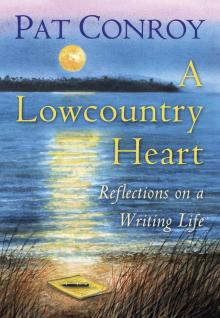 A Lowcountry Heart: Reflections on a Writing Life
A Lowcountry Heart: Reflections on a Writing Life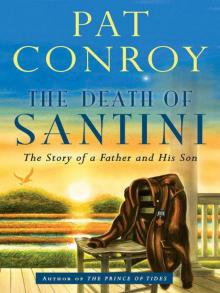 The Death of Santini: The Story of a Father and His Son
The Death of Santini: The Story of a Father and His Son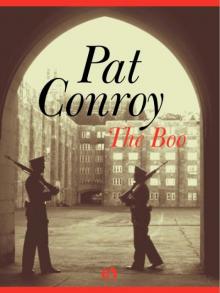 The Boo
The Boo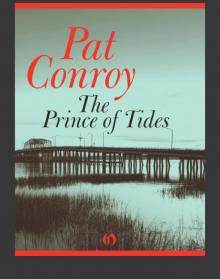 The Prince of Tides
The Prince of Tides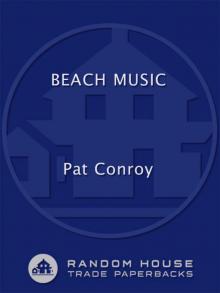 Beach Music
Beach Music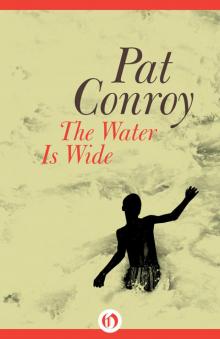 The Water Is Wide
The Water Is Wide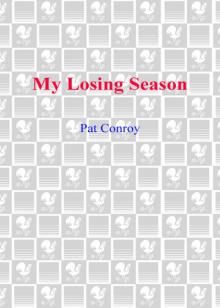 My Losing Season
My Losing Season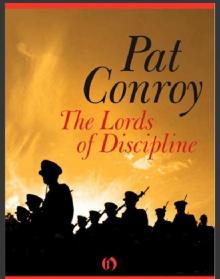 The Lords of Discipline
The Lords of Discipline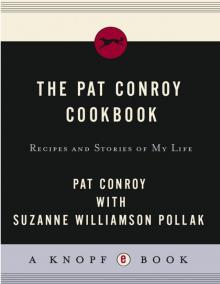 Pat Conroy Cookbook
Pat Conroy Cookbook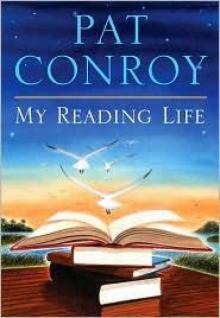 My Reading Life
My Reading Life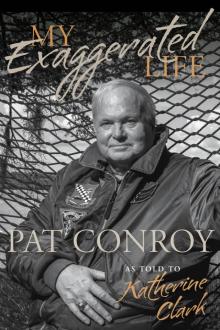 My Exaggerated Life
My Exaggerated Life The Pat Conroy Cookbook
The Pat Conroy Cookbook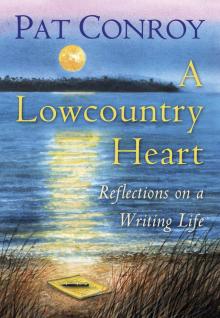 A Lowcountry Heart
A Lowcountry Heart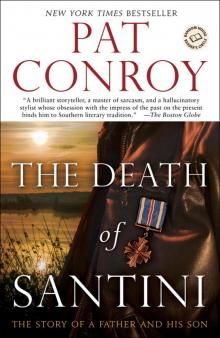 The Death of Santini
The Death of Santini